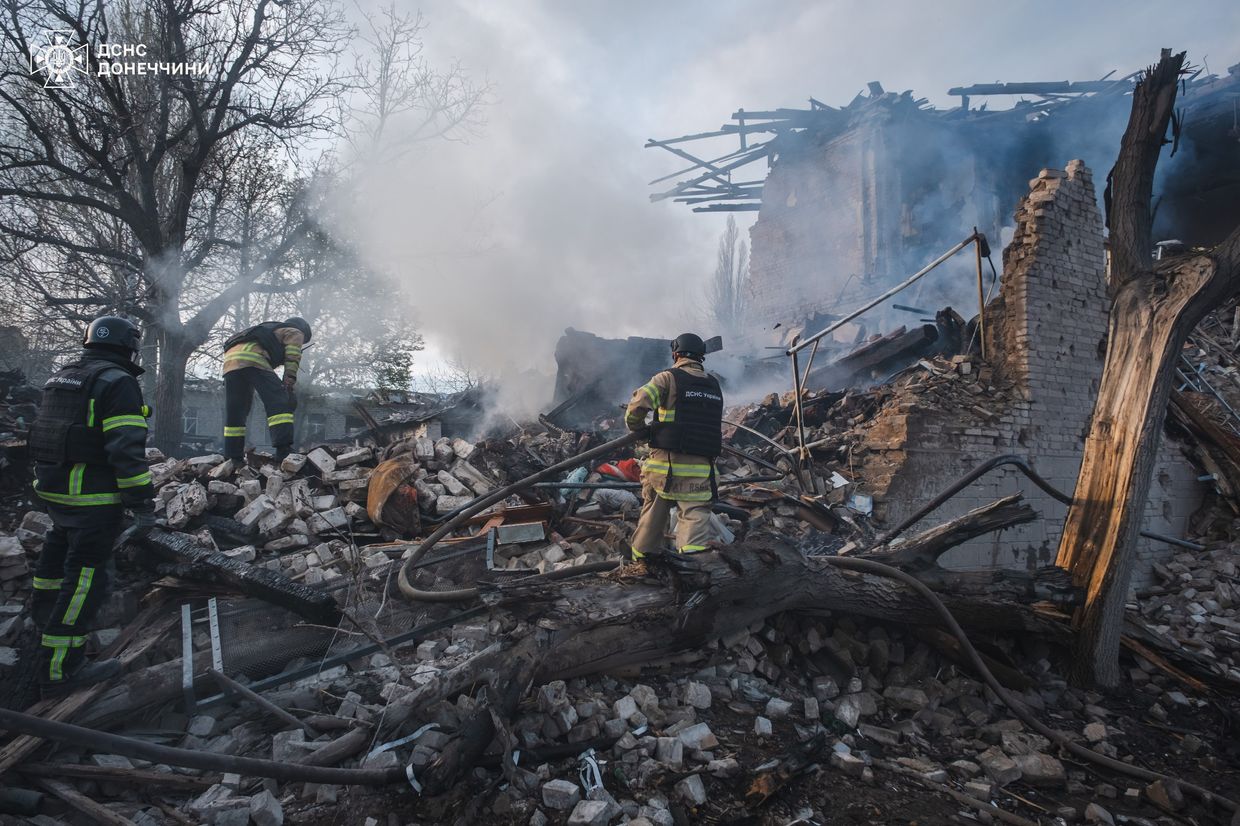Daily Flyer - April 10, 2024
A voice of Ukraine to the West

Russia announces investigation into Ukrainian company Burisma, linked to Biden's son, for financing terrorism
On April 9th, Russia made a startling announcement, revealing the initiation of an investigation into Burisma, a Ukrainian gas company linked to Hunter Biden, the son of U.S. President Joe Biden. The probe is purportedly focusing on suspicions of financing terrorism, allegedly in connection with the tragic mass shooting that occurred in Moscow back in March.
The investigation revolves around the serious accusation that high-ranking officials from the U.S. and other NATO countries were funneling funds through Burisma to finance terrorist activities within Russia and beyond.
The horrifying attack in Moscow claimed the lives of at least 145 innocent individuals and was claimed by a branch of the Islamic State known as ISIS-K. However, despite ISIS's acknowledgment and the absence of any substantial evidence implicating Ukraine, Russian officials persist in attempting to tie the attack to Ukraine.
Responding to the Investigative Committee's accusations against Burisma and the insinuation of U.S. and NATO involvement in sponsoring terrorism, U.S. National Security Adviser Jake Sullivan swiftly dismissed the charges as "nonsense."
"Russia is well aware that it was ISIS that orchestrated the heinous terrorist attack in Moscow," Sullivan emphasized.
Hunter Biden's tenure on the board of Burisma from 2014 to 2019, overlapping with his father's second term as vice president, has long been a subject of scrutiny. Republicans have continuously sought to paint Hunter Biden as having illicitly profited from his ties to Burisma, further alleging that Joe Biden leveraged his official capacity to shield him from investigation.
However, these allegations regarding President Biden or his son's involvement in any illegal activities related to Burisma have been thoroughly discredited.
These baseless claims gained significant traction in the U.S. during the lead-up to the 2020 presidential election, fueled in part by a broader campaign among Biden's political adversaries, who sought to exploit his son's engagements in Ukraine to undermine his candidacy.
The allegations formed the core of a political scandal that led to the first impeachment charge against former U.S. President Donald Trump. Trump was accused of pressuring President Volodymyr Zelensky in July 2019 to initiate an investigation into Biden and his son, threatening to withhold aid to Ukraine as leverage.
Russian attack on Kostiantynivka on April 9 kills 3, including child

On April 9th, tragedy struck the city of Kostiantynivka in Donetsk Oblast as a Russian strike targeted an apartment building, leading to devastating consequences. Ukraine's State Emergency Service reported on April 10th that two additional bodies were recovered from the rubble, bringing the grim death toll to three individuals.
The strike inflicted significant damage to a two-story building, leaving behind a scene of destruction and despair. Initial reports from emergency services on April 9th detailed the loss of a 60-year-old man, while two others sustained injuries.
As rescue operations concluded the following morning, the somber reality of the situation became even clearer, with the discovery of the lifeless bodies of a 43-year-old woman and a 13-year-old boy, as documented in the State Emergency Service's report.
According to Donetsk Oblast Governor Vadym Filashkin, the latest assault by Russian forces on Kostiantynivka left a trail of destruction, damaging 27 houses, three high-rise buildings, two critical infrastructure facilities, and an administrative building.
In addition to the tragedy in Kostiantynivka, Russian forces also targeted the outskirts of Sloviansk in Donetsk Oblast, resulting in injuries to three individuals.
The daily assaults on settlements in Ukraine's eastern Donetsk Oblast serve as a grim reminder of the relentless violence inflicted by Russian forces, exacerbated by their close proximity to the front lines. Amidst heavy fighting, the region remains a battleground as Russia relentlessly pursues its goal of occupying the entire area.
Ukraine's attacks on Russian oil could threaten global energy market - Lloyd Austin
U.S. Defense Secretary Lloyd Austin has issued a stark warning, emphasizing the potential repercussions of recent Ukrainian strikes on Russian oil refineries, cautioning of a possible "knock-on effect" on the global energy market, as reported by Bloomberg on April 9th.
In a bold move, Ukrainian forces have launched a series of drone strikes aimed at disrupting Russia's oil industry, with reports indicating successful hits on 12 Russian oil refineries spread across multiple regions deep inside Russian territory as of March 17th.
The scope of Ukrainian aggression extended even further when they targeted one of Russia's largest oil refineries in Nizhnekamsk, located in Tatarstan, over 1,000 kilometers (620 miles) from Ukraine's border, in an attack on April 2nd.
Bloomberg's reporting suggests that the United States has been navigating a delicate balance, aiming to curb Russian petroleum exports that sustain the ongoing conflict in Ukraine while ensuring stability in global energy markets to mitigate inflationary pressures and support the global economy's steady trajectory.
Although measures like imposing a price cap on Russian oil exports initially showed promise, concerns have emerged, with global oil prices recently reaching their highest levels in almost six months, largely attributed to escalating tensions in the Middle East.
During a Senate Armed Services committee meeting, Secretary Austin underscored the strategic imperative for Ukraine to focus on tactical and operational targets directly impacting the ongoing conflict. However, his stance faced criticism from Republican Senator Tom Cotton, who accused the Biden administration of hindering effective Ukrainian action for political expediency.
Bloomberg's analysis indicates that Russia's seaborne crude exports experienced a decline at the start of April compared to the year-to-date high reached the previous month, partially attributed to reduced shipments from the country's Baltic ports. The decrease was particularly notable in Primorsk and Ust-Luga, where volumes declined by approximately 20%.
This pullback in exports follows a surge in flows from these ports in the final weeks of March, coinciding with Ukrainian drone strikes on refineries, which may have prompted a diversion of crude into exports rather than domestic processing, as per Bloomberg's findings.
In response to inquiries regarding Ukrainian strikes on Russian oil facilities, U.S. Secretary of State Antony Blinken affirmed that the United States neither supported nor facilitated such attacks, aiming to maintain a delicate diplomatic balance.
Moreover, Reuters reported on April 4th, citing unnamed sources familiar with the matter, that Russian companies are encountering challenges in repairing oil refineries due to Western sanctions, and Ukrainian attacks could exacerbate these issues, further complicating the situation.

